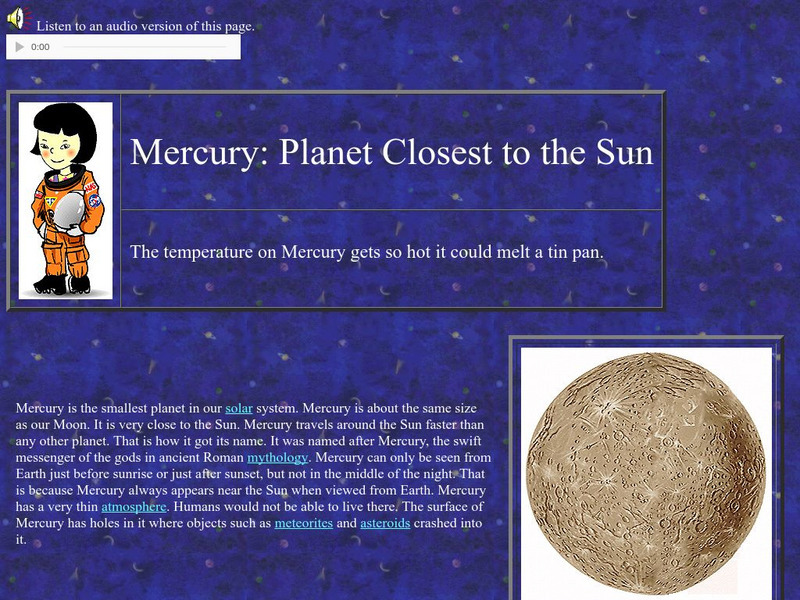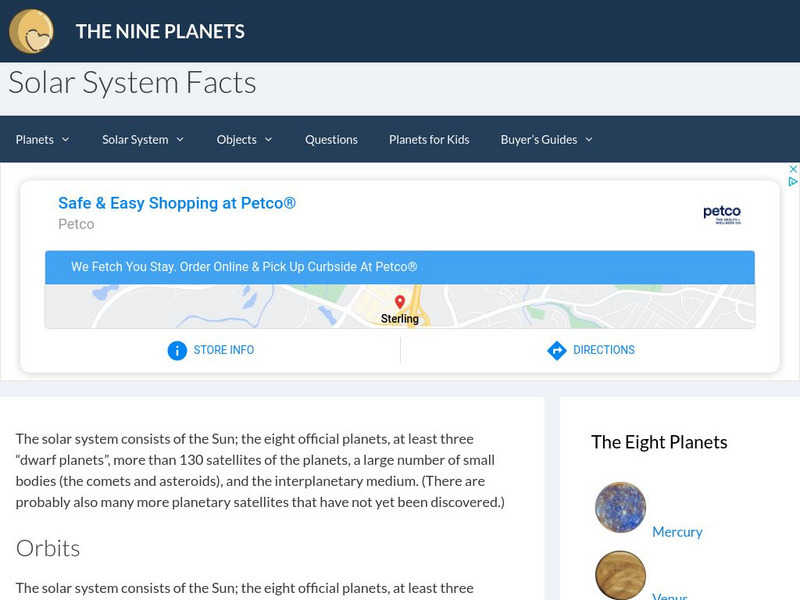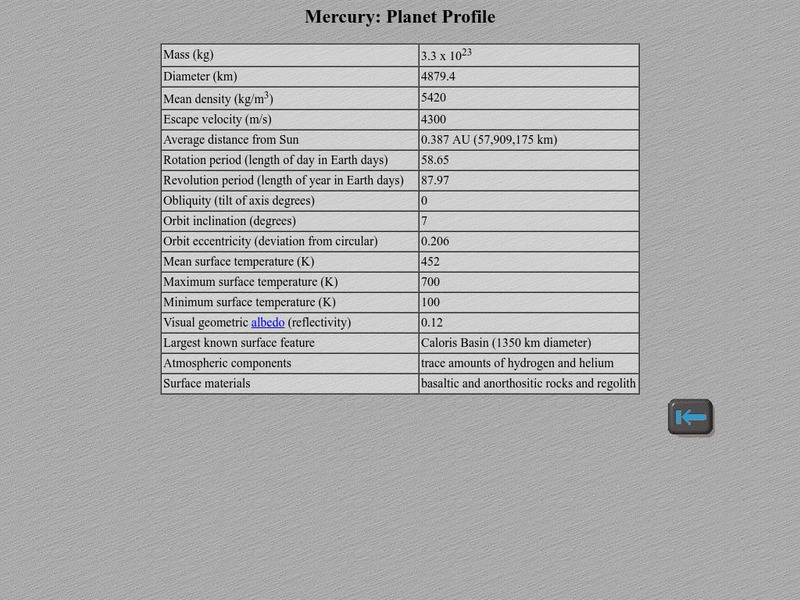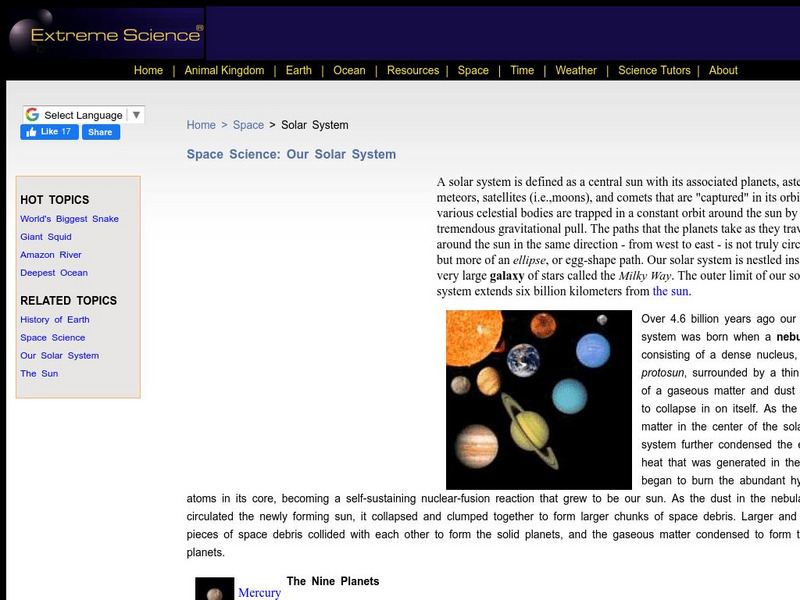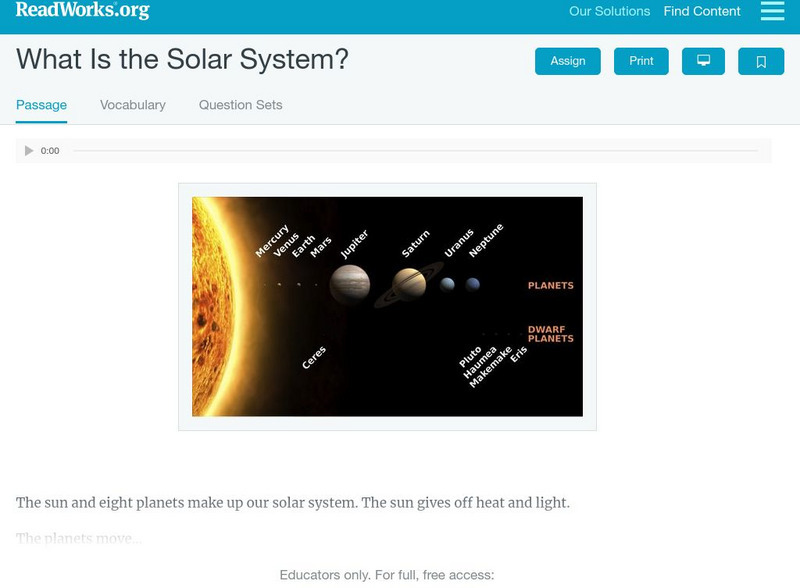Hi, what do you want to do?
Ducksters
Ducksters: Astronomy for Kids: The Planet Mercury
Kids learn about the planet Mercury of the Solar System including fun facts, mass, day, year, and distance from the Sun. Astronomy for kids and teachers.
NASA
Nasa Star Child: Mercury
Provides good information about Mercury and is a good starting point for information about the planet along with pictures and audio. Links to a simple fact table, puzzle, glossary, and more detailed information.
TeachEngineering
Teach Engineering: Mercury and Venus
Young scholars explore Mercury and Venus, the first and second planets nearest the Sun. They learn about the planets' characteristics, including their differences from Earth. Students also learn how engineers are involved in the study of...
Nine Planets
The Nine Planets: An Overview of the Solar System
A detailed overview of the history, mythology, and current scientific knowledge of each of the planets and moons in the solar system.
Science4Fun
Science4 Fun: Mercury
Learn fun facts and details about the atmosphere, geography, composition, and discovery of Mercury, the closest planet to the sun.
NASA
Nasa: Mercury Planet Profile
This page from NASA provides a chart of statistical information on planet Mercury. Its mass, diameter, average temperature, and distance from the Sun are among the characteristics listed.
Wonderville Media
Wonderville: Planets
There are eight planets in orbit around our Sun. These planets form our solar system. The eight planets are Mercury, Venus, Earth, Mars, Jupiter, Saturn, Uranus, and Neptune. There are also rocks, moons, comets, and other objects going...
Smithsonian Institution
National Air and Space Museum: Exploring the Planets: Ancient Times & the Greeks
In ancient times only five planets were known: Mercury, Venus, Mars, Jupiter, and Saturn. Learn about Greek astronomer Ptolemy's theory for the solar system that was to survive for fourteen centuries.
Other
University of Cambridge: Astro Adventure
Imagine a time when you can travel through space, planet to planet, cheaply and in comfort, when you can take a trip to the stars as your next holiday. Well, imagine no more. Learn more about the solar system as you take this trip of a...
Nine Planets
The Eight Planets: Just for Kids
Here is a clear, simple picture of the solar system. Click on the names of the planets to learn more about each. Clicking on underlined terms takes you to more and more detailed scientific information.
NASA
Nasa: Solar System Exploration
Enter our solar system to interact with the planets, moons, asteroids, meteors, and more. Investigate with NASA scientists and explore missions related to space exploration. Read facts, compare statistics, look through resources, and...
NASA
Nasa: Solar System Exploration
This stunning site on the solar system gives a great overview of the planets and our sun. Learn about each object's size, vital statistics, and moons. Then go on for a more in depth look at these objects in the column on the left.
Texas Education Agency
Texas Gateway: The Sun Is the Center of the Solar System
See what you know about the solar system by taking this brief interactive quiz and learning module.
ClassFlow
Class Flow: Space Solar System
[Free Registration/Login Required] In this lesson students will compare and contrast the attributes of star, star patterns and planets. Students will also have the opportunity to review facts about each planet and then complete various...
Extreme Science
Extreme Science: Space Science: Our Solar System
Read about our solar system and its formation over 4.6 billion years ago. Find out about the planets, asteroids, meteors, satellites, and comets. More in-depth planet background can be accessed through links.
A&E Television
History.com: The Space Race: Interactive Universe
A virtual journey through space offers photos and facts about Earth and its neighboring planets, comets, other celestial bodies of the Solar System, and the Milky Way and Andromeda galaxies.
Read Works
Read Works: What Is the Solar System?
[Free Registration/Login Required] An informational text about the solar system. A question sheet is available to help students build skills in reading comprehension.
Other
The Apollo Society: The Solar System
Contains a small set of images of solar system objects and a series of links to information about all solar system objects. Solar System Tours link to excellent image collections.
NASA
Nasa: Discovery Mission: Messenger
The MESSENGER (MErcury: Surface, Space ENvironment, GEochemistry and Ranging) mission is a scientific investigation of the planet Mercury. This site provides information about its mission objectives and management.
Georgia Department of Education
Ga Virtual Learning: Our Solar System
This interactive tutorial will take students on a tour of our solar system. Students begin near the Sun with the really hot planets of Mercury and Venus. They will learn about Mars, probably the first planet that humans will visit. Next...
NASA
Nasa: Image Science Center: Ask the Space Scientist
A NASA scientist, Dr. Sten Odenwald, answers many students' questions. Topics include planets, galaxies, black holes, the origin of the universe, and common misconceptions about space.
Other
Canal Kids: Ciencias (Science for Portuguese Speakers)
Colorful, engagingly written information about astronomy and biology for Portuguese-speaking English language learners. Both subjects are broken down into a broad array of related subtopics. The biology section is particularly helpful...
Enchanted Learning
Enchanted Learning: Zoom Astronomy
Where is our Solar System? How far away is the sun? What makes up the sun? Find out all you want to know about our solar system. This is a comprehensive on-line site about space and astronomy. Check out all of the excitement!
Curated OER
Exploratorium: Your Weight on Other Worlds
Want to lose weight in a hurry? Just step on a scale on almost any other planet! This page allows you to enter your weight on Earth and it will calculate your weight on all of the other planets, some moons and even some stars. Requires a...






